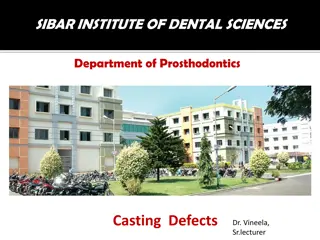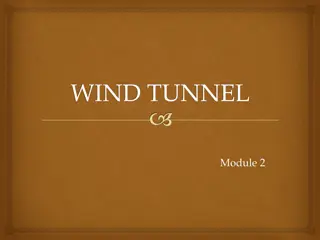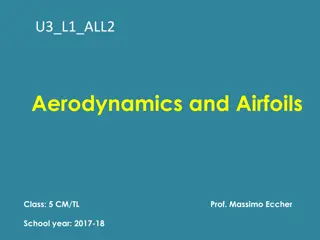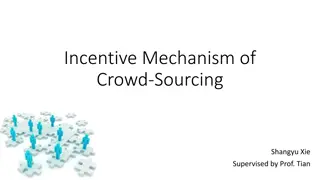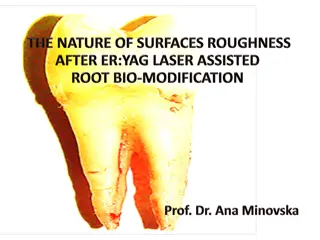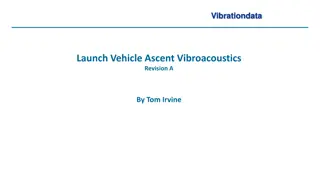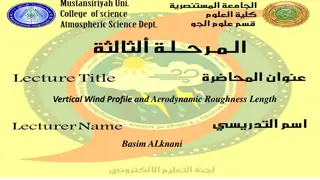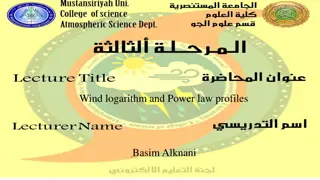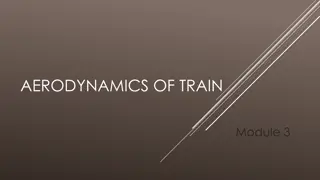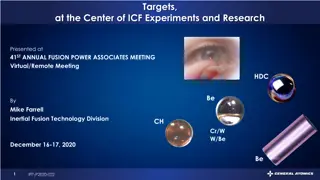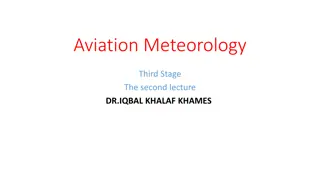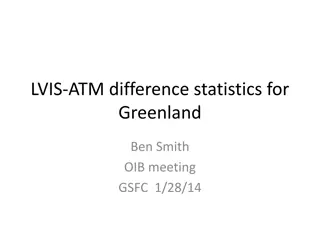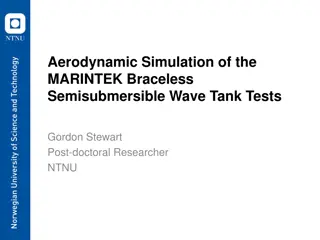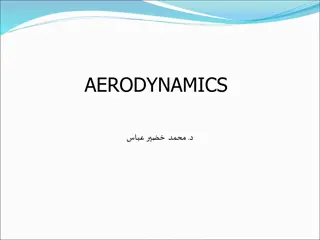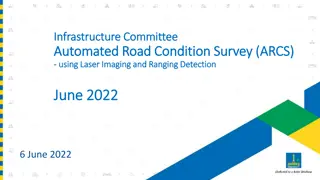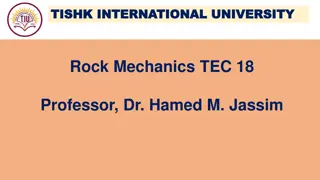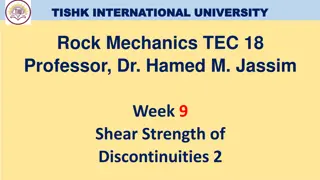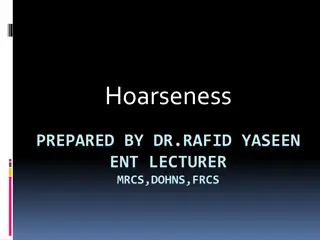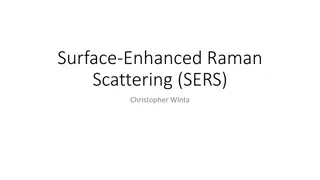Common Casting Defects in Prosthodontics: Causes and Prevention
Casting defects in prosthodontics can result from errors in the casting procedure, leading to issues like distortion, surface roughness, porosity, and incomplete detail. Various causes such as stress relaxation during wax pattern preparation can contribute to distortion, while factors like air bubbl
11 views • 27 slides
Wind Tunnels: Devices for Aerodynamic Testing
Wind tunnels are devices that simulate air flows to test models under controlled conditions. They are classified as low-speed and high-speed tunnels, used to replicate flying or moving objects. Testing involves studying air motion using techniques like smoke visualization, colored threads, and speci
4 views • 37 slides
The Design of Airfoils and Wing Dihedral
The design of airfoils and wings involves key terminologies like mean chamber line, leading edge, trailing edge, chord line, and camber. Dihedral is an important aspect of wing design that affects stability and control. Aerodynamic forces on a wing, like lift and drag, are crucial for flight perform
5 views • 10 slides
Incentive Mechanisms in Crowdsourcing
Understanding the concept of crowdsourcing and the importance of incentive mechanisms in harnessing the power of a large group of people to accomplish tasks. The journey involves navigating challenges like data roughness, human complexity, and the drive for research, while emphasizing the need for q
5 views • 30 slides
Root Surface Modifications in Periodontal Therapy
Periodontal therapeutic modalities focus on root surface modifications due to periodontitis, which involves physical, chemical, and cytotoxic changes. Successful outcomes depend on factors like clot stability, cell migration, attachment, proliferation, and debridement. Analyzing cementum properties
4 views • 6 slides
Lacrosse Fouls and Penalties: A Comprehensive Guide
This guide provides detailed explanations of various lacrosse fouls and penalties, including personal fouls, cross-checking, illegal body checks, slashing, tripping, unnecessary roughness, and unsportsmanlike conduct. Each section describes the specific actions that constitute a foul, the penalties
3 views • 24 slides
Aeroacoustic Analysis of Launch Vehicle Ascent Dynamics
Investigate the vibroacoustics of launch vehicle ascent, focusing on the formation of turbulent boundary layers, aerodynamic excitation sources, and dynamic pressure coefficients. Learn about the transition to turbulent flow, shockwave formation, and the analysis steps involved in determining vibrat
4 views • 30 slides
Lift: The Aerodynamic Force in Airplanes
Lift is the aerodynamic force that opposes the weight of an airplane, keeping it airborne. It is generated by the motion of the aircraft through the air, with the wings playing a crucial role in lift production. The amount of lift depends on various factors like the shape, size, and velocity of the
8 views • 35 slides
Vertical Wind Profiles and Aerodynamic Roughness Length
The interaction between wind and the Earth's surface affects wind profiles and aerodynamic roughness length. The nature of airflow over surfaces, changes in wind speed with height, and the concept of aerodynamic roughness length are explained. Techniques for estimating aerodynamic roughness length b
5 views • 8 slides
Wind Profiles and Aerodynamic Roughness Length
Wind profiles are crucial in understanding how wind speed changes with height in the boundary layer. The logarithmic and power law profiles depict this relationship, influenced by surface characteristics and obstacles. The aerodynamic roughness length, defining where wind speed becomes zero, remains
2 views • 14 slides
The Aerodynamics of Train Systems
The aerodynamic characteristics of high-speed railway trains are unique due to their long length, interaction with surrounding structures, and influence of cross-winds. Aerodynamic drag significantly impacts energy consumption, with the drag being proportional to the square of speed. Precise evaluat
4 views • 11 slides
Advances in Target Manufacturing for Inertial Confinement Fusion Experiments
Target manufacturing for inertial confinement fusion (ICF) experiments is a crucial focus area, with recent advancements highlighting the need for precision and detail in target design and fabrication. The presentation at the 41st Annual Fusion Power Associates Meeting emphasized the importance of m
4 views • 13 slides
Aeroelasticity: Deformation and Aerodynamic Forces
Aeroelasticity explores the intricate relationship between the deformation of elastic structures in an airstream and the resulting aerodynamic forces. This field of study is vital for predicting and managing interactions between structural mechanics and aerodynamics in aircraft design. Historical in
4 views • 15 slides
Drag in Aviation: Factors and Effects
Drag in aviation is the aerodynamic force that opposes an aircraft's motion through the air. It is generated by every part of the airplane and depends on factors like the shape of the aircraft, surface roughness, and velocity. Drag is influenced by the size of the airplane, cross-sectional shape, an
4 views • 28 slides
Analyzing ATM-LVIS Difference Statistics for Greenland
The presentation discusses the analysis of ATM-LVIS difference statistics for Greenland, highlighting proposed processing refinements that are expected to have a minimal impact. The data editing process for ATM and LVIS measurements, histogram of slope-corrected differences, differences by slope and
1 views • 10 slides
Aerodynamic Simulation of MARINTEK Braceless Semisubmersible: Insights and Tools
Explore the aerodynamic simulation of the MARINTEK Braceless Semisubmersible through advanced techniques and tools. Discover the unique aerodynamic actuator, simulation models, and tools used in the research conducted by Gordon Stewart, a post-doctoral researcher at NTNU. Gain insights into the expe
3 views • 16 slides
Foot Care Cream For Cracked Feet Online In India
Nourishing foot care cream for cracked feet, deeply moisturizing to heal dryness and roughness. Available online in India for smooth feet.
1 views • 4 slides
Aerodynamic Forces and Moments in Fluid Dynamics
Introduction to aerodynamic forces and moments in the study of fluid dynamics, particularly focusing on air as the primary medium of interest. The discussion covers thermodynamic properties, continuum hypothesis, and fundamental principles of classical mechanics applied to the analysis of aerodynami
4 views • 35 slides
Aerodynamics: Fundamentals and Applications
Aerodynamics is the study of airflow around objects and its impact on forces and moments. This field covers fundamental principles, aerodynamic variables, forces and moments, practical objectives, and more. By exploring topics like flow similarity and dimensional analysis, aerodynamic engineers pred
4 views • 17 slides
AVATAR Project: Advancements in Aerodynamic Tools for Large Rotors
The AVATAR project, funded by the European Union's Seventh Programme, focuses on advancing aerodynamic tools for large wind turbines, specifically in the 10-20MW range. Led by a consortium of top research institutions and industry partners, AVATAR aims to elevate aerodynamic and fluid-structure mode
0 views • 16 slides
AVATAR Project - Advanced Aerodynamic Tools for Large Rotors
The AVATAR project, funded by the European Union, aimed to enhance aerodynamic models for 10-20MW wind turbines, focusing on offshore applications to reduce Levelized Cost of Energy (LCOE). Led by EERA, the consortium included top research institutions and industry partners. The project ran from Nov
0 views • 6 slides
Numerical Analysis of Aerodynamic Performances in Biplane Configuration
This paper presents a numerical investigation comparing single versus double wing (biplane) configurations for aerodynamic performances. Geometric models and numerical analyses were conducted, providing insights into the advantages and complexities of biplane wings. The study utilized computational
2 views • 12 slides
Automated Road Condition Survey Using Laser Imaging and Ranging Detection - June 2022
Infrastructure Committee conducted an Automated Road Condition Survey using Laser Imaging and Ranging Detection in June 2022. The survey covered 5835 km of roads with a value of $7B. It included sub-arterial, arterial roads, and industrial access, with key indicators for performance criteria. The su
0 views • 9 slides
Rock Mechanics TEC 18 Professor, Dr. Hamed M. Jassim
The Rock Mechanics course at TISHK INTERNATIONAL UNIVERSITY covers various topics such as Rock Mass Strength, RMR combined parameters, Stand Up Time for Tunnels, Rock Mass Deformability Modulus, and more. The course material includes input and output charts for determining different parameters relat
3 views • 24 slides
Rock Mechanics TEC 18
TISHK INTERNATIONAL UNIVERSITY professor Dr. Hamed M. Jassim explores shear strength behavior of rock discontinuities. Discover Barton's estimate for shear strength and the non-linear strength criterion for rock joints developed by Barton and Choubey. Learn about joint roughness coefficients, compre
3 views • 33 slides
Design of a Lightweight Mounted Tip/Tilt Mirror
This document presents the design considerations for a lightweight mounted tip/tilt mirror by Mike Borden. It outlines various design problems, materials, and manufacturing considerations such as stiffness-to-weight ratios and thermal stresses. The analysis includes a comparison of materials like UL
0 views • 16 slides
Fractal Dimension and Roughness Measurement in Biological Cell Boundaries
This content discusses the concept of fractal dimension in cell colony boundaries, focusing on measuring roughness using the Box-Counting method. It delves into the practical estimation of fractal dimension, covering definitions, preliminary concepts, and the application to tumor boundaries. Additio
11 views • 28 slides
Hoarseness: Causes, Clinical Approach, and Treatment Options
Hoarseness, or roughness of voice, can result from various factors affecting vocal cords' function. Inflammation, structural, neuromuscular, and muscle tension imbalances are common causes. Clinical assessment by a laryngologist and voice therapist is crucial for accurate diagnosis and treatment. Su
3 views • 32 slides
Hoarseness: Causes, Symptoms, and Treatment
Hoarseness is roughness of voice caused by various factors such as inflammation, structural issues, and muscle tension imbalance. Learn about the clinical approach, common causes like acute laryngitis, and supportive measures for treatment.
3 views • 31 slides
Friction in Machines
Friction plays a crucial role in machine operations, with various types like static, dynamic, sliding, rolling, and pivot friction influencing performance. Learn about the laws governing static and dynamic friction, and the impact of surface roughness on friction forces in machine components.
1 views • 21 slides
Aerodynamic Drag in Aircraft
Aerodynamic drag is a resistance force that opposes an aircraft's motion through the air. It is generated by every part of the airplane and depends on factors like object geometry, surface roughness, and air velocity. Factors affecting drag include object shape, motion through the air, and air prope
3 views • 14 slides
Design of Stable Channels
Grass-lined channels are commonly used in urban areas to manage storm water flow. The design considerations differ from concrete-lined channels due to susceptibility to erosion and inundation. Understanding the relationship between vegetation, channel roughness, and flow velocity is essential for cr
0 views • 12 slides
Composite Materials Characterization
Composite materials play a vital role in advanced fields like aerospace and automobiles. Characterization of composites is crucial for product development, involving physical and chemical analyses. Key studies include mechanical, thermal, electrical, and more. Factors like volume fraction, voids, an
3 views • 13 slides
Vertical Wind Profile and Aerodynamic Roughness Length
Learn about the nature of airflow over different surfaces, the vertical wind profile in the boundary layer, and the significance of aerodynamic roughness length in determining wind speed behavior. Explore how aerodynamic roughness length is defined and its implications for various surfaces.
0 views • 8 slides
Enhancing Raman Scattering with Surface-Enhanced Raman Scattering (SERS)
Surface-Enhanced Raman Scattering (SERS) offers a significant improvement in sensitivity over normal Raman scattering, with enhancements of up to 10^6. The theory behind SERS involves roughness, periodic structures, resonance frequencies, and the enhancement of incident light through electromagnetic
4 views • 12 slides
Understanding Lacrosse Fouls: Personal and Technical Infractions Explained
Learn about personal and technical fouls in lacrosse, including what constitutes a personal foul, penalties involved, and specific types of fouls such as cross-checking, illegal body checks, slashing, tripping, unnecessary roughness, and unsportsmanlike conduct.
5 views • 24 slides
Wind Logarithm and Power Law Profiles: Modeling Wind Speed Profiles
Explore the mathematical models of wind profiles, including the logarithmic law profile and power law profile. Learn how these models estimate wind speed based on factors like surface stress and roughness. Understand the relationships between variables and how to calculate wind speed at different he
1 views • 11 slides
Strategies for Emittance Reduction in Solid Photocathodes
Explore limits and strategies for reducing emittance in solid photocathodes due to surface non-uniformities like physical roughness, quantum scale effects, and chemical roughness. Discover techniques involving disordered and ordered surfaces to optimize electron emission efficiency.
0 views • 18 slides
Understanding Wing Design and Aerodynamics: Terminology and Concepts
Explore the intricate world of aerodynamics and airfoil design, diving into terminology such as mean chamber line, leading edge, trailing edge, chord line, camber, and more. Learn about the aerodynamic force on a wing, resolving aerodynamic forces for rockets, and the variation of lift, drag, and mo
0 views • 10 slides
Foot Cream For Cracked Heels & Rough Heels
Foot Cream for Cracked Heels & Rough Heels deeply moisturizes, softens, and repairs dry skin. Enriched with nourishing ingredients, it heals cracks, smoothens roughness, and restores healthy, soft, and supple feet with regular use.
2 views • 4 slides
